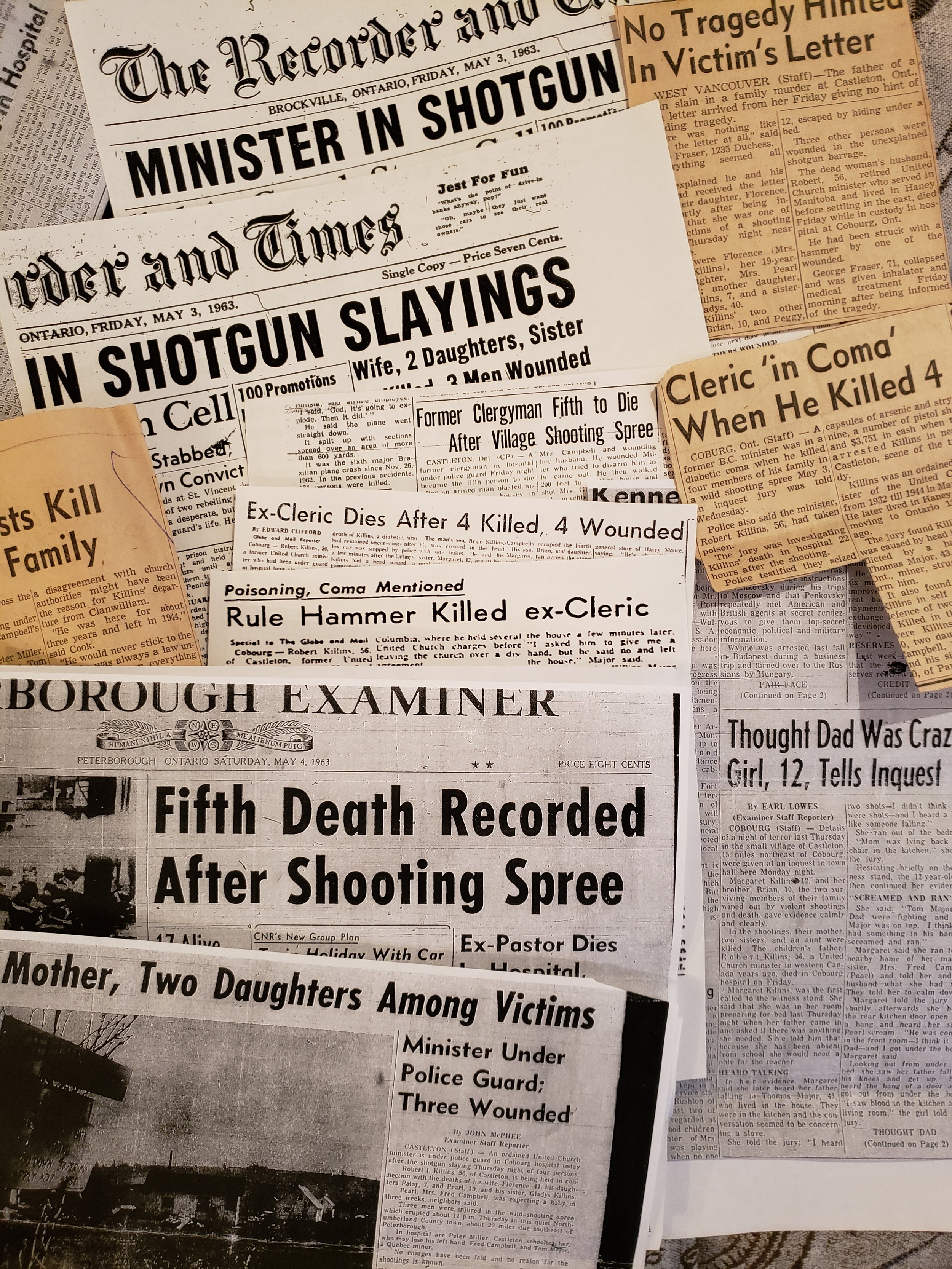
The Castleton Massacre
Survivors' Stories of the Killins Femicides
Ninth Best Selling Non Fiction Canadian Book
Why was a former United Church Minister, who had stalked his estranged wife for sixteen years, living outside her back door in an unheated shack, left to plan the murder of his family with no interventions by police?
How does an award-winning scholar turn into a mass murderer?
Why was the long-term domestic abuse of this case ignored by almost everyone?
Why did the perpetrator dose himself with poison over a series of months as he planned the familicide?
Did the murderer bury money in jars around his property, and if so, why? Why did he train his hatred on the one person whom he adored most in the world, his pretty, talented daughter, murdering her too?
How can we explain a series of mysterious fires set around the property where the massacre occurred, some long after the events of the familicide in May 1963?
Why has this femicide been lost in time, known to only those who observed it or to family members caught in the murderer’s tangled plans?
To answer these and other questions, read The Castleton Massacre, available by July 2022.
Tracking The Story
After the perpetrator butchered as many of the women in his family as he could in a horrific femicide in May 1963, the story of the Castleton Massacre became virtually unknown in short order.
Explanations for the silence are various: the massacre had occurred in a rural hamlet of Eastern Ontario, far away from most media sources and advocates for support services for victims of domestic abuse. The local police had not performed notably well, and most people were happy to forget this tragic chapter in the community’s life. As well, the two surviving children were removed within days by their aunt and uncle, who took them to live with them in Calgary, so the remaining children of the massacre were out of sight. Finally, there was no language or much sympathy for domestic abuse in 1963, an era when a man’s home was his “castle”. Hence, no one thought this important enough to document.
The result was the loss of local or national memory about the massacre by all but those who were observers of it or who lived through it. This also erased most of the documentary sources that might have existed about the familicide. There were no OPP records on which to draw, or even a formal transcript of the two inquests carried out; newspaper accounts across North America did carry the story, but they were riddled with errors. Regardless, the media stories with imputed motives and inaccurate observations were reproduced in most papers over the course of a few weeks in May and June. In many cases, these news reports seeded the basis of long-term community memories. Nothing beyond a retrospective twenty years after the event in a local newspaper has ever been written about the event.
The result of this lack of formal documentation was a reliance on oral histories – of those who were in the community at the time, or who were children and heard their parents’ stories; family members who tried to clean up after the massacre, or who sheltered the children as relatives tried to figure out where they would best live. Of greatest importance were the oral histories of the two survivors to the events of that May in 1963. Without their memories, analyses and ongoing questions, we would never have been able to piece the story together.
Learn more from the podcast True Murder: The Most Shocking Killers featuring Sharon Anne Cook and Margaret Carson.
A Collage of Newspaper Headings from May 1963
Painting by AG Killins
Painting by AG Killins
Painting by AG Killins
Ada Gladys Killins
Painting by AG Killins
Painting by AG Killins
Robert and Florence
Bill Fraser, Robert Killins and George Fraser, 1939
Painting by AG Killins
Gladys, dressed up and sitting on the stoop of her cabin in the 1940s
This is an example of the galoshes that Robert wore over his slippers
Card written by Florence to her brother George in 1962
Card written by Florence to her brother George in 1962
Pearl in a moment of happiness in 1955
Pearl age 16, 1960
Patsy, Florence, Brian, 1963
Painting by AG Killins
Authors
SHARON ANNE COOK
Sharon Anne Cook is Distinguished University Professor Emerita in the Faculty of Education at the University of Ottawa. She continues to teach graduate courses in educational history. She is the mother of two sons and grandmother to four (almost) perfect granddaughters and is the niece of the perpetrator of this familicide.
MARGARET CARSON
Margaret Carson is a retired educator whose experience incudes developing, delivering, and coordinating a wide range of workplace and industry courses. She lives outside of Ottawa, Ontario, close to her many grandchildren.























